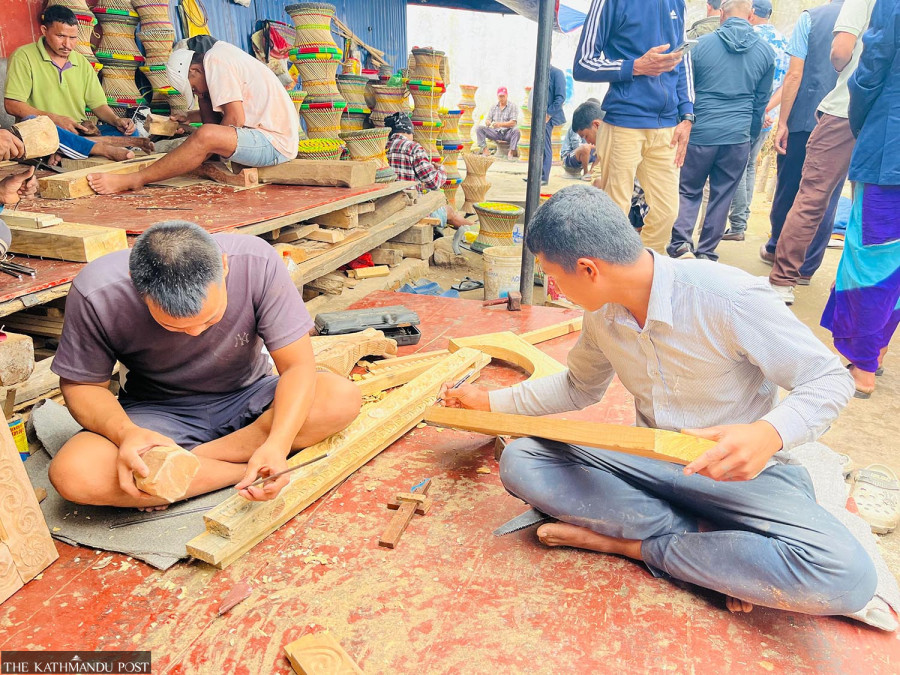Money
Jailed but not failed: Gulmi inmates turn prison into industrial unit
Prisoners craft exports bound for the UAE and Japan. Woodcarving inmates earn up to Rs45,000 a month.
Santosh Mahatara
As you enter the gate, a symphony of sounds greets your ears. Some are carving wood into shapes, others are giving form to construction materials. Everyone is engrossed in their tasks, leaving no one idle.
Eighteen individuals are busy working intricate patterns in wood, forty are crafting furniture, thirty-eight are weaving stools, twelve are working on fabric looms, and seven are knitting caps and sweaters—their creative hands constantly in motion.
This might seem like a well-run industrial operation, but in fact, this is a typical scene at the Gulmi District Prison.
A glance inside reveals what looks like a hub of factory and creativity. A facility meant to incarcerate has transformed into something resembling an industrial village.
The lead craftsman is a 52-year-old inmate from Makwanpur currently serving time in this prison. He has been designing “Ankhi Jhyal”, a carved wooden frame, for 26 years in Kathmandu and has spent the last two years in Gulmi prison.
Here, he has also taken the initiative to teach his skills to other inmates. “I used to do this work outside, and now I’m passing it on while continuing my craft,” he says. “I’m earning Rs45,000 a month.”
He plans to continue in the same profession even after serving his sentence. He supports a family of four—his parents and two children—by sending money home directly from the prison.
A 30-year-old inmate from Palpa, who has been doing time here for five years, initially only wove stools.
Over the past two years, he has expanded his skill set to include wood carving. All these skills were acquired inside the prison.
Nowadays, he supports a six-member family, including his parents, two sisters, a brother, and a son. “With these new skills, I now earn Rs25,000 a month,” he says. “After my release, I plan to turn this into a business.”
He is now skilled in stool weaving and wood carving, among other crafts.
Another inmate, a 31-year-old man from Baglung, has continued his previous furniture-making profession while serving his sentence here. Imprisoned for the past seven years, he says he has learned additional skills in prison and now earns about Rs30,000 a month.
“My craftsmanship has improved, and I’ve started earning as well,” he says. “Once you learn a skill, it’s useful anywhere.”
Currently, the Gulmi prison houses 104 inmates.
Except for one dependent and one disabled individuals, all other inmates are engaged in some form of work. Monthly earnings range from Rs10,000 to Rs45,000.
The prison now produces a wide range of goods, including temple fittings, wooden windows, statues, door frames, stools, photo frames, sofas, tables, kitchen and office furniture, textiles, caps, and sweaters.
To support this production, the prison consumes about 700 cubic feet of sal (Shorea robusta) wood and another 3,000 cubic feet of various woods each month.
Reshmi Raj Panthi, chief of Gulmi Prison, said the prison generated business worth Rs30 million last year and expects the turnover to reach Rs60 million this year.
Products made in this prison are being exported to major cities across Nepal and many foreign countries.
Hari Thapa, chief of the prison’s internal administration, said that salwood-crafted windows and sofas are currently being exported to Dubai, Japan, Malaysia, India, Macau, Singapore, and Australia.
“At present, we’re exporting to seven countries, and we’ve received inquiries from others as well,” he said.
The prison has the capacity for 20 male and five female inmates.
He believes prisons should be recognised as industrial zones or factories, especially when inmates are engaged in productive labour. After improving kitchen facilities and sleeping arrangements and introducing income-generating work for inmates, the overall prison environment has significantly improved.
Two years ago, this prison only engaged inmates in stool weaving and textile work. But through a tripartite partnership involving the District Administration Office, the prison, and jail administration, it has now developed into a full-fledged industrial enterprise, said Panthi. “In terms of work, this prison has already become an industry,” he explains.
“The state should officially recognise employment generation and economic benefit.” He believes that if the prison is officially registered as an industrial prison, earnings could increase even more.
Janardan Gautam, chief district officer of Gulmi, sees this as a model for utilising skills at a prison for income generation. “The central government needs to develop policies to turn prisons into industrial villages,” he said. “We’re also taking initiatives.”
He advocates for a prison management system that embraces policies for open prisons, rehabilitation homes, and industrial villages.




 24.74°C Kathmandu
24.74°C Kathmandu















